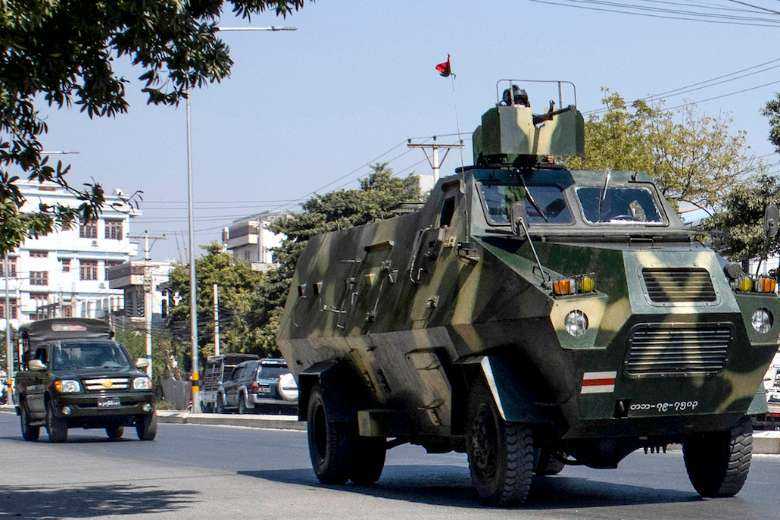
The civil wars that have roiled the country for 73 years pose both a threat and an opportunity for military leaders

Military vehicles move along a street in Mandalay on Feb. 2 as Myanmar's generals appeared in firm control a day after a surgical coup that saw democracy heroine Aung San Suu Kyi detained. (Photo: AFP)
In the early hours of Feb. 1, when it was apparent that Myanmar’s feared military — known as the Tatmadaw — was rounding up the country most senior politicians in the first step of a lightning coup, respected historian and author Thant Mynt-U tweeted: “The doors just opened to a very different future. I have a sinking feeling that no one will really be able to control what comes next. And remember Myanmar is a country awash in weapons, with deep divisions across ethnic and religious lines, where millions can barely feed themselves.”
Despite the plea from the nation’s deposed de facto leader Aung San Suu Kyi for her people to resist the military takeover in a handwritten letter posted on her Facebook page, resistance is most likely to come from the dozens of armed militias that pepper Myanmar’s seven ethnic states.
There is some irony in this, as Suu Kyi’s signature project was the Panglong Peace Project, named after an initiative begun by her father Aung San during his brief time leading the country out of British rule before his untimely assassination. Its aim was to bring together, after more than seven decades of serial civil wars, Myanmar’s warring people. It was always a project where bitter experience outweighed hope and was sadly unrealized despite arguably too much time and effort from her government.
Already the Tatmadaw is mired in a long-running civil war with four militias led by the Kachin Independence Army. An uneasy ceasefire has been regularly broken.
Much in the region remains unresolved, including the brutal rape and murder of two Christian teachers in Shan state, allegedly by 28 members of the Tatmadaw. More than 100,000 people remain in internally displaced person (IDP) camps dotted around Kachin and Shan states, many run by Catholic and Protestant groups.
In recent years, long-dormant conflicts have bubbled to the surface once again in places like Kayin (Karen) state on the Thai border. The European Karen Network claims that the Tatmadaw in early December 2020 began deliberately firing artillery shells into civilian areas, breaking the nationwide ceasefire agreement.
The network said one civilian was killed and two injured, including a child. “These attacks are war crimes,” it said, adding that 4,000 people had been forced to flee into the jungle.
Radio Free Asia reported in late January that 170 social and civil society groups on Jan. 20 sent letters to President Win Myint and State Counselor Aung San Suu Kyi appealing for help to end the armed conflict in Kayin state. With the military now in full control, those protests now have no audience.
Kayin state is also home to many Christians, mainly Protestants. Neighboring Kayah state has fewer people but is more heavily Catholic and disputes with the military, although not as violent as in Kayin, have escalated in recent years.
And then there is a growing battle between the military and the Arakan Army in Rakhine state, a conflict interwoven with the ethnic cleansing of the Rohingya.
Much of the fighting in the north has been on the Chinese border, and Beijing has been playing an increasing role in trying to resolve the conflict to protect its creeping grey border economy and its transport corridor plans to the Bay of Bengal.
It’s clear that the Chinese were blindsided by the coup. Wang Yi, the Middle Kingdom’s foreign minister, had only been in Myanmar in mid-January to meet officials from the National League for Democracy (NLD), which won last November’s general election in a landslide even greater than its victory five years earlier.
But China has designs on Myanmar’s resources, including undersea energy and hydropower using Myanmar’s mighty rivers. It wants to accelerate its Belt and Road Initiative of a transport corridor from its southern Yunnan province through Kachin, Chin and Rakhine states, all mired in conflict.
Still, it’s just possible that things may go the other way if the military plays its cards cleverly. The NLD has failed to live up to its promise of a national unity government, once more deciding to select regional and state chief ministers without consultation after the 2020 election in the same way it did in 2015.
“As the NLD has secured an electoral landslide to form the government, it is very likely that the chief ministers will be from the party. We did the same [after the 2015 victory]. We followed the 2008 constitution and it is not that we forcibly took the decision,” NLD vice-chairperson Zaw Myint Maung said.
The military could attempt to strike peace deals with the ethnic militias and, as the holder of most of the weapons, it is in a much better position to do so. For the sake of the people of Myanmar, it should try. Leaning on the military-written constitution that the NLD has fought to amend may not turn out to be the sharpest move that Aung San Suu Kyi has made.
The views expressed in this article are those of the author and do not necessarily reflect the official editorial position of UCA News.
Help us keep UCA News independent
The Church in Asia needs objective and independent journalism to speak the truth about the Church and the state.
With a network of professionally qualified journalists and editors across Asia, UCA News is just about meeting that need. But professionalism does not come cheap. We depend on you, our readers, to help maintain our independence and seek that truth.
A small donation of US$2 a month would make a big difference in our quest to achieve our goal.

Share your comments